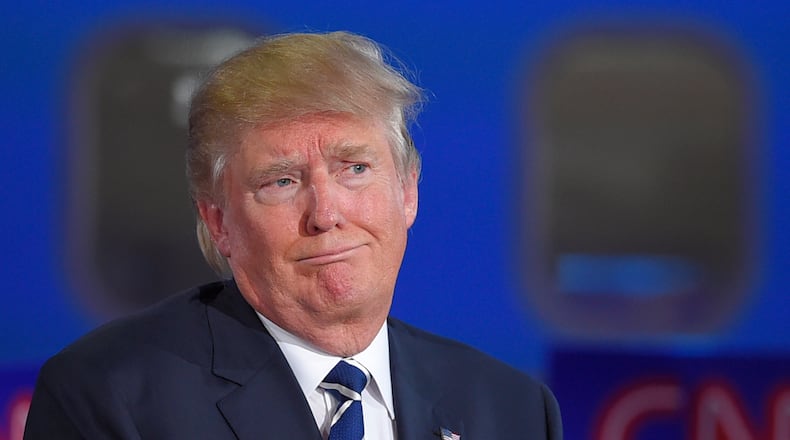The fallout from President Trump's firing of FBI Director James Comey continues, and the most damning detail so far isn't about the timing of this move vis-a-vis the bureau's investigation of Michael Flynn. It's that the White House wasn't at all prepared for the blowback it got once Comey's dismissal was revealed.
Democrats and much of the media want to focus on the first subject. And indeed, as I wrote late last night , it doesn't at all look good that Trump fired Comey after a grand jury issued subpoenas -- to reiterate, not indictments -- in the Flynn investigation. But to speak of this as a "constitutional crisis" or some kind of dangerous moment is not just a tell by those who, perversely, might just want the Trump presidency to spark such a crisis and, eventually, his removal from office. It's an inapt description of what's really going on here.
First things first: The director of the FBI works in the Department of Justice, which is an agency of the executive branch, which is headed by the president. As such, the president is well within his constitutional authority to fire the director of the FBI. It is a sign of the insanity of our current political environment that this needs to be said, but there it is. (I might add, Comey's removal with no nominee to replace him waiting in the wings -- more on that in a moment -- elevates as acting director a man who Trump and many of his supporters view as no friend of the president .)
Second: While the foregoing is true, it is also true that Congress is charged with overseeing agencies like the FBI as a check against their power. To the extent presidents from both parties have sought to expand executive power, the blame largely lies with legislators from both parties letting them get away with it. There has never been a better time for Congress to rectify this situation. And the fact that (so far) five Republican senators have voiced skepticism about the timing and rationale for Trump's firing of Comey suggests they may be prepared to take that oversight role seriously. That includes not only insisting on a replacement at the FBI whose credentials and independence are beyond question -- Merrick Garland, anyone? -- but, in the meantime, keeping close tabs on how Comey's firing is affecting existing investigations and any new ones that may become necessary. If just three of those five Republicans hold their ground, they and Senate Democrats have enough votes to deny Trump his new nominee and anything else they deem necessary to restore and uphold the FBI's credibility. Comey's firing need not derail any investigation into Trump's campaign or any of his associates, if Congress is willing to do its duty.
Speaking of the FBI's credibility, folks on both sides of the political spectrum need to take a deep breath and acknowledge it had suffered greatly in the final months of Comey's tenure. It suffered in the eyes of Republicans when Comey took the extraordinary steps of 1) holding a press conference to discuss the bureau's investigation of Hillary Clinton and 2) deciding himself that there would be no charges against her (which is the job for a prosecutor, not a law-enforcement official like Comey). It suffered in the eyes of Democrats when Comey announced in late October he had re-opened the Clinton probe, and then reversed himself two days before the election, and again this week when he erred fairly egregiously in his testimony about the episode before the Senate. Reasonable people on both sides should be able to look at all that and conclude Comey was no longer a credible leader for an agency that vitally needs credibility, and that his dismissal can be justified quite apart from the very legitimate questions about timing and repercussions and replacing him.
***
So now we come to the part about preparation. By all accounts, the White House mismanaged the particulars of Comey's dismissal in just about every imaginable way . Trump reportedly expected it to be viewed as a "win-win" and not with such extreme skepticism. Even some high-level administration officials didn't know it was coming, and no communications strategy was ready to help explain the why and when of the decision. Unlike the last time a president fired an FBI director (Bill Clinton axing William Sessions in 1993), it appears there's no replacement ready to be named the next day. Comey was so caught off-guard by the move that, while speaking to FBI agents in Los Angeles, his first reaction was to dismiss it as a joke. Worse was the fact Comey was on the other side of the country when he was fired -- leading to an O.J. Simpson-like televising of his attempt to navigate Los Angeles' crowded freeways -- and wasn't told of his dismissal personally. The fact that notification of his firing went instead by hand delivery to FBI headquarters, when Comey wasn't even there, is just one more sign of mismanagement.
These mistakes were not made necessary by time pressures. The only possible rationale for Trump's choosing Tuesday as the day to fire Comey was the fact that was the date on the memo by the deputy attorney general outlining Comey's missteps in the Clinton investigation. But that's not a good reason to move ahead the same day rather than waiting for Comey to return to Washington.
As a result, if Trump were truly trying to regain control of the narrative over the FBI's Russia investigation, as some reports have it, he has accomplished the exact opposite. Just like with his insistence on continuing to use social media no matter what problems it might create for him, Trump too often is his own worst enemy.
The crisis here, if such exists, is one of competence, not constitutionality.
About the Author
The Latest
Featured



